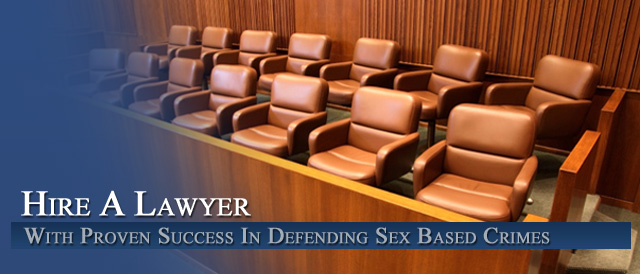




Colorado Child Pornography Defenses – Denver Internet Crimes Defense Lawyer – Law Firm – H. Michael Steinberg
Colorado’s laws prohibiting child pornography or the law entitled “sexual exploitation of a child” (often viewed as a form of child abuse) are felonies under the laws found at CRS 18-6-403.
Depending on the circumstance, you may be charged with a state or federal crime.
If convicted of a child porn offense, you are subject to very difficult intensive supervision probation, long periods of incarceration, and a long term form of penalty- the requirement to register as a sex offender.
Quick Aside:The Crime of Failure to Register as a Sex Offender in Colorado: Types of Crimes
Who is Required to Register as a Sex Offender?
The following persons (adults and juveniles) are required to register as sex offenders if they were:
Any person who was convicted on or after July 1, 1991, in Colorado for C.R.S. 18-3-411(1) unlawful sexual offense; C.R.S. 18-3-305 enticement of a child; C.R.S. 18-3-306 internet luring of a child; (generally considered to be any sex offense against children).
Any person who was convicted on or after July 1, 1991, in another state or jurisdiction, including but not limited to, a military or federal jurisdiction, of an offense, if committed in Colorado, would constitute C.R.S. 18-3-411(1) unlawful sexual offense, C.R.S. 18-3-3-5 enticement of a child; C.R.S. 18-3-306 internet luring of a child.
Any person who was released on or after July 1, 1991, from the Department of Corrections (DOC) of this state or any other state, having served a sentence for 18-3-411(1) unlawful sexual offense; C.R.S. 18-3-305 enticement of a child; C.R.S. 18-3-306 internet luring of a child.
On or after July 1, 1994, any person convicted of or received a deferred sentence in Colorado or any other state of an offense involving unlawful sexual behavior, and including criminal attempts, conspiracy, or solicitation, (generally considered to by any sex offense or other offense where the underlying factual basis includes sexual behavior.)
Defenses to Colorado Laws – Sexual Exploitation of Children Charges
Entrapment, mistake, and, of course, outright innocence are just some of the defenses that make this charge certainly one worth fighting. Just because you are accused of a crime relating to child pornography does not mean that you must be convicted of that crime.
Colorado’s Sexual Exploitation of a Child Law:
18-6-403. Sexual exploitation of a child.
(1) The general assembly hereby finds and declares: That the sexual exploitation of children constitutes a wrongful invasion of the child’s right of privacy and results in social, developmental, and emotional injury to the child; that a child below the age of eighteen years is incapable of giving informed consent to the use of his or her body for a sexual purpose; and that to protect children from sexual exploitation it is necessary to prohibit the production of material which involves or is derived from such exploitation and to exclude all such material from the channels of trade and commerce.
(1.5) The general assembly further finds and declares that the mere possession or control of any sexually exploitative material results in continuing victimization of our children by the fact that such material is a permanent record of an act or acts of sexual abuse of a child; that each time such material is shown or viewed, the child is harmed; that such material is used to break down the will and resistance of other children to encourage them to participate in similar acts of sexual abuse; that laws banning the production and distribution of such material are insufficient to halt this abuse; that in order to stop the sexual exploitation and abuse of our children, it is necessary for the state to ban the possession of any sexually exploitative materials; and that the state has a compelling interest in outlawing the possession of any sexually exploitative materials in order to protect society as a whole, and particularly the privacy, health, and emotional welfare of its children.
(2) As used in this section, unless the context otherwise requires: (Definition Section)
(a) “Child” means a person who is less than eighteen years of age.
(b) (Deleted by amendment, L. 2003, p. 1882, § 1, effective July 1, 2003.)
(c) “Erotic fondling” means touching a person’s clothed or unclothed genitals or pubic area, developing or undeveloped genitals or pubic area (if the person is a child), buttocks, breasts, or developing or undeveloped breast area (if the person is a child), for the purpose of real or simulated overt sexual gratification or stimulation of one or more of the persons involved. “Erotic fondling” shall not be construed to include physical contact, even if affectionate, which is not for the purpose of real or simulated overt sexual gratification or stimulation of one or more of the persons involved.
(d) “Erotic nudity” means the display of the human male or female genitals or pubic area, the undeveloped or developing genitals or pubic area of the human male or female child, the human breasts, or the undeveloped or developing breast area of the human child, for the purpose of real or simulated overt sexual gratification or stimulation of one or more of the persons involved.
(e) “Explicit sexual conduct” means sexual intercourse, erotic fondling, erotic nudity, masturbation, sadomasochism, or sexual excitement.
(f) “Masturbation” means the real or simulated touching, rubbing, or otherwise stimulating of a person’s own clothed or unclothed genitals or pubic area, developing or undeveloped genitals or pubic area (if the person is a child), buttocks, breasts, or developing or undeveloped breast area (if the person is a child), by manual manipulation or self-induced or with an artificial instrument, for the purpose of real or simulated overt sexual gratification or arousal of the person.
(g) “Sadomasochism” means:
(I) Real or simulated flagellation or torture for the purpose of real or simulated sexual stimulation or gratification; or
(II) The real or simulated condition of being fettered, bound, or otherwise physically restrained for sexual stimulation or gratification of a person.
(h) “Sexual excitement” means the real or simulated condition of human male or female genitals when in a state of real or simulated overt sexual stimulation or arousal.
(i) “Sexual intercourse” means real or simulated intercourse, whether genital-genital, oral-genital, anal-genital, or oral-anal, between persons of the same or opposite sex, or between a human and an animal, or with an artificial genital.
(j) “Sexually exploitative material” means any photograph, motion picture, video, video tape, print, negative, slide, or other mechanically, electronically, chemically, or digitally reproduced visual material that depicts a child engaged in, participating in, observing, or being used for explicit sexual conduct.
(k) “Video”, “video tape”, or “motion picture” means any material that depicts a moving image of a child engaged in, participating in, observing, or being used for explicit sexual conduct.
(3) A person commits sexual exploitation of a child if, for any purpose, he or she knowingly:
(a) Causes, induces, entices, or permits a child to engage in, or be used for, any explicit sexual conduct for the making of any sexually exploitative material; or
(b) Prepares, arranges for, publishes, including but not limited to publishing through digital or electronic means, produces, promotes, makes, sells, finances, offers, exhibits, advertises, deals in, or distributes, including but not limited to distributing through digital or electronic means, any sexually exploitative material; or
(b.5) Possesses or controls any sexually exploitative material for any purpose; except that this paragraph (b.5) does not apply to peace officers or court personnel in the performance of their official duties, nor does it apply to physicians, psychologists, therapists, or social workers, so long as such persons are licensed in the state of Colorado and the persons possess such materials in the course of a bona fide treatment or evaluation program at the treatment or evaluation site; or
(c) Possesses with the intent to deal in, sell, or distribute, including but not limited to distributing through digital or electronic means, any sexually exploitative material; or
(d) Causes, induces, entices, or permits a child to engage in, or be used for, any explicit sexual conduct for the purpose of producing a performance.
(5) (a) Except as provided in paragraph (b) of this subsection (5), sexual exploitation of a child is a class 3 felony.
(b) Sexual exploitation of a child by possession of sexually exploitative material pursuant to paragraph (b.5) of subsection (3) of this section is a class 6 felony; except that said offense is a class 4 felony if:
(I) It is a second or subsequent offense; or
(II) The possession is of a video, video tape, or motion picture or more than twenty different items qualifying as sexually exploitative material.
In order to better understand the crime of child pornography…and the defenses that are applicable what follows is a a comprehensive guide to…
Colorado child pornography laws by addressing the following topics
How Does Colorado Law Define Child Pornography? (see the law reprinted in full above)
How Does the Prosecutor Prove that I am Guilty of an Colorado Offense Involving Child Pornography?
Colorado Internet Sting Operations and their Role in Child Pornography Prosecutions
What are the Defenses to Colorado Child Pornography Charges?
Penalties, Punishment, and Sentencing for Colorado Child Pornography
How Does Colorado Define Child Pornography?
Colorado child pornography law is most clearly defined under: (see law above):
The most critical provision out of the Colorado laws dealing with Colorado Child Pornography is the definition of Sexually Exploitive Material.
(j) “Sexually exploitative material” means any photograph, motion picture, video, video tape, print, negative, slide, or other mechanically, electronically, chemically, or digitally reproduced visual material that depicts a child engaged in, participating in, observing, or being used for explicit sexual conduct
How Does the Prosecutor Prove that I am Guilty of an Offense Involving Colorado Child Pornography?
The state and federal laws relating to child porn are technical and complex, especially because the legislature has come up with so many different types of offenses that relate to this subject.
This is one of the reasons why it is critical to contact a Colorado criminal defense attorney who understands exactly how to defend these types of allegations immediately upon your arrest.
The specific act with which you are charged, determines which facts the prosecutor must prove.
There are at least two general facts (otherwise known as “elements of the crime”) that the prosecutor must prove before he/she can convict you of any child pornography offense.
That you “knowingly” committed one of the above acts, and
That you knew (or reasonably should have known) that the persons involved were under 18.
So how does the prosecutor even find out about these activities? Largely through Internet sting operations.
Colorado Internet Sting Operations and their Role in Child Pornography Prosecutions
Internet sting operations are constantly on the rise as one of the most popular ways to target and arrest those suspected of violating Colorado child pornography laws. While the internet used to allow people to solicit, distribute, collect, and view child porn anonymously, that’s not so much the case anymore.
Both local law enforcement agencies and the FBI are making Internet child porn stings one of their top priorities in an effort to zero in on this increasing phenomenon.
Officers and agents go on-line and pose as people interested in buying, selling, or exchanging child porn…they enter chat-rooms, pretending to be kids who may be interested in appearing in or working for those in the child pornography industry…they set up “hyperlinks” that allegedly lead to films of kids having sex…all in an effort to arrest anyone who is involved with any activity relating to child pornography.
How are the police getting your information?
Since the Internet is fairly new (relatively speaking), there isn’t too much legislation regulating the obligations of Internet Service Providers “ISPs”. This means that ISPs usually cooperate with law enforcement agencies who subpoena information about their users. It also means that they may engage in a certain amount of self-regulation by removing sites dealing with child porn or by filtering the browsers and search engines that their customers use to locate such sites.
In addition, computer software is available that allows law enforcement to monitor online activity and identify the e-mail addresses of chat room contributors.
Peer to peer file sharing – Limewire an Other Peer to Peer Networks
Another area where federal and Colorado state officers are cracking down on individuals involved with child porn is in “peer to peer” sharing groups. Those who participate in peer to peer (otherwise known as P2P) groups eliminate an Internet server and directly link their computers together.
In much the same manner as Internet users, P2P groups were able to share, download, upload, and distribute child porn in a semi-private manner…however, this is no longer the case. As law enforcement becomes more technologically sophisticated, they are learning more ways to infiltrate these types of groups.
Once the officers get your name from the ISP, they then apply for a search warrant.
Colorado Search Warrants
Once the decoy officers see that you are interested in what they are offering, they take that evidence to a district attorney or straight to a judge to apply for a search warrant.
If granted, which they usually are in these types of cases, Colorado search warrants allow the officers or agents to search your home, office, computer files, etc. — anywhere they reasonably suspect evidence of the suspected criminal activity will be discovered.
If your computer is confiscated, any downloaded images saved to your hard drive will be used against you. In addition, experts will de construct your hard drive to pull all files (even the deleted ones), evaluate when you were on-line, review your Web browser history, e-mail and chat logs…anything they can to obtain incriminating evidence.
Colorado”Sexting”
In much the same manner as personal computers store information, mobile devices do as well. PDAs, cell phones, etc. are capable of receiving, storing, and sending images depicting child pornography.
Perhaps one of the most rampant forms of this is called sexting. “Sexting” refers to the sexual messages and naked pictures that kids are sending to their girlfriends/boyfriends. Anyone (including kids) who “sexts” an image of a naked or partially naked minor is subject to prosecution for violating Colorado child pornography laws…and to the devastating consequences that are imposed in connection with these violations.16
What are the Defenses to Colorado Child Pornography Charges?
There are certain defenses that an experienced Colorado child pornography defense lawyer can present on your behalf. The following is a brief description of some of the most popular.
Entrapment
Colorado entrapment law acts as a defense to child porn charges when the police entice or persuade you to commit a crime that you otherwise had no intention of committing.
Example: You are visiting what you believe is an adults-only chat room and are engaged in a conversation by an undercover officer who begins asking you questions about children engaged in sex acts. Perhaps you’re intrigued, believing that you’re simply fantasizing about a taboo topic and entertain the conversation when illegal activity is ultimately suggested.
Another common situation occurs when an undercover officer convinces you in a chat room or via a “spam pop-up” to buy child porn…something that you had never previously entertained as your idea.
Depending on the exact circumstances, your Colorado criminal defense attorney could argue that you had no predisposition to engage in a child porn offense, but only did so based on the officer luring you into to do so.
Illegal search and seizure
Illegal search and seizure may be raised as a defense if the cops either (1) obtained an illegal search warrant (if, for example, they didn’t follow the proper procedures to obtain it or supplied false information to do so), or (2) searched or seized property that was “beyond the scope” of what was described in the warrant.
Innocence / mistake / no knowledge / no intent
Spam may advertise child porn…a pop-up link may appear while you’re browsing an unrelated site…you may accidentally view a child pornography site by simply mistyping a key word or by going to a .com site instead of a .net site…
Any of these situations could act as a defense to you knowingly and intentionally viewing or otherwise engaging in an activity dealing with child porn. If illegal content is sent (without your permission) to your e-mail or accidentally downloaded to your computer, you can’t be convicted of violating Colorado’s child pornography laws.
The content isn’t applicable
Even though it may depict children engaged in sexually explicit activities, there are some types of “content” that are excluded from child pornography prosecutions. Possessing “pornographic” images of minors in drawings, figurines, statues or in films that have been rated by the Motion Picture Association of America are exempt from Colorado child pornography laws.
Similarly, if you possess or distribute images that are used for “legitimate educational or scientific purposes”, you must be acquitted of these charges. The judge or jury will determine whether the material meets that definition.
The group who will view the material,
The purpose for which they will view it, and
The likelihood that it will fall into the hands of another are some of the questions that the judge/jury will consider when evaluating this defense.
Age
In order to be convicted of any Colorado child pornography offense, the people depicted in the materials must be under 18. With respect to certain offenses the possessor must additionally know that the people are under 18.
If you don’t know that the participants are under 18, that may act as a defense to this charge. It follows that possessing porn labeled “barely legal”, for example, would support your claim that you knew (or had reason to know) that the people shown were, in fact, adults. It should be noted that expert testimony may be introduced to establish the ages of the participants who appear in alleged pornographic matter.
False accusations
This would most likely be raised in a situation where, perhaps, you are engaged in a nasty custody proceeding and your ex “plants” evidence of child porn in your home, office, car, etc. or downloads this type of material onto your computer. Or maybe the material was discovered at your home or work, but it really belonged to someone else.
Psychological addiction
Perhaps you are guilty of the charged offense. If it can be shown that you have a psychological addiction to the material (and are remorseful about your conduct), you may be able to receive leniency from the DA and or court and counseling as a part of your probationary sentence.
Your Colorado child pornography defense attorney could argue that the interests of justice would be better served if you could receive a sentence designed to rehabilitate (rather than punish) you based on your recognized medical condition.
Penalties, Punishment, and Sentencing for Child Pornography
If you are convicted for violating a Colorado child pornography law, you face a variety of penalties and sentencing, depending on (1) the exact offense with which you are charged, (2) your criminal history, and (3) whether you are charged with a state or federal crime.
As previously stated, child porn offenses are prosecuted as felonies – see the other pages on this website for penalty provisions.
The Lifetime Provisions of the Colorado Sex Offender Treatment Act
What crimes fall under the Lifetime Supervision Act?
The Sex Offender Lifetime Supervision Act of 1998 with its amendments requires a lifetime supervision sentence for almost all class 2, 3 and 4 felony sex offenses. Many so-called “economic” sex crimes such as trafficking children and sexual exploitation (including felony crimes related to child pornography) fall under the provisions of the Lifetime Supervision Act but it is not automatic.
Before the lifetime supervision sentence can be applied to these types of “economic”sex crimes, the court must find that the offender is likely to commit sexual assault, unlawful sexual contact, sexual assault on a child or sexual assault on a child by one in a position of trust. The court must also find that the victim was a stranger to the offender or a person with whom the offender established or promoted a relationship with primarily for the purpose of sexual victimization.
If a person falls under the Lifetime Supervision Act, what happens at sentencing?
If the offender is eligible for and sentenced to probation, probation is for a minimum of 10 years to a maximum of life for a class 4 felony, and a minimum of 20 years and a maximum of life for a class 2 or 3 felony. Intensive supervision probation is required for all lifetime probationers until further order of the court.
If a person is sentenced to the Department of Corrections for a lifetime offense, the court is required to sentence the offender to at least the minimum of the presumptive range of sentencing to a maximum of life. Currently, at the Department of Corrections, the minimum sentence does not mean anything in terms of release. It sets the earliest date at which a person may apply for parole. A person sentenced under the lifetime act can assume it is possible that they will serve a life sentence for the offense.
Other Articles of Interest:
- Understanding The Internet Crimes Against Children (ICAC) Task Force’s Impact on Colorado
- In 2011 – The Federal Prosecution of Child Pornography Cases
- 18-3-405.4 C.R.S. Internet Sexual Exploitation of a Child
- Colorado Child Pornography – Sexual Exploitation of Children Cases – From Charging To Trial
- Understanding Colorado Sexual Exploitation Child Pornography Law – The Search Warrant












